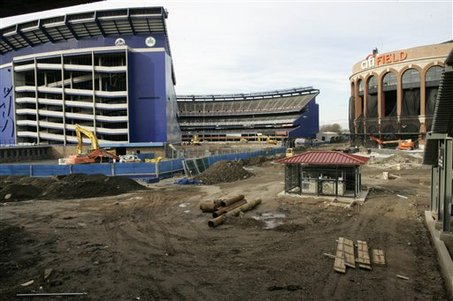Ever since the Mets were purchased outright by Fred Wilpon in 2000 they have been treated less like a baseball team and more like an apartment complex. Real estate moguls like the Wilpons make their money by speculating, purchasing, (occasionally tossing out your token poor and elderly), rehabbing and selling (or renting) properties for big profits … just like monopoly.
While it’s true that the Mets play (and make much of their money) in what is a structure made of concrete and steel, as a franchise they are not necessarily bound to the grandiose edifices of Citi Field. The Mets are essentially an entertainment entity, and entertainment is an industry that functions on a wholly different set of principles. An industry that makes money through viewership — a vast billion dollar popularity contest where our attention is bought and sold in advertising blocks. Now it is no easy task trying to coalesce these two disparate business models into a single successful enterprise, even so, some are better at it than others.
Fred Wilpon made his fortune buying and selling real estate so naturally he has focused a great deal of his time on infrastructure and capital expenditures. One of his earliest disagreements with Nelson Doubleday (who had a knack for knowing what the fans actually wanted) was a difference over whether or not to build a wildly expensive new venue or improve Shea Stadium.
 Doubleday was quoted in the NY Observer by Andrew Rice during the 2000 season on the subject, “I don’t see a great deal of taxpayer money to build the New York Mets a new stadium,” he said, suggesting that for “one-tenth of the money or one-hundredth of the money,” Shea Stadium could simply be renovated. “I kind of like this place,” he added. Now how many of you would trade Citi Field for good old inexpensive Shea with a couple more world titles thrown in for good measure? For a rich guy, Doubleday sure seemed to have a better grasp of your common Met fan, a fan (and demographic) incidentally that’s been virtually priced out of a surprisingly upscale Citi Field.
Doubleday was quoted in the NY Observer by Andrew Rice during the 2000 season on the subject, “I don’t see a great deal of taxpayer money to build the New York Mets a new stadium,” he said, suggesting that for “one-tenth of the money or one-hundredth of the money,” Shea Stadium could simply be renovated. “I kind of like this place,” he added. Now how many of you would trade Citi Field for good old inexpensive Shea with a couple more world titles thrown in for good measure? For a rich guy, Doubleday sure seemed to have a better grasp of your common Met fan, a fan (and demographic) incidentally that’s been virtually priced out of a surprisingly upscale Citi Field.
In Fred Wilpon’s almost quaint and tragic desire to restore an Ebbets Field to the N.Y. landscape, his dream of building a new stadium resulted in the debt riddled quagmire he’s still mired in. He assumed property would always appreciate, he believed cash would always be at the ready, he predicted everything would work as it had during his real estate heyday, but not only did he assume wrong on every one of those counts, he lost touch with his decidedly working class audience and its demands in the interim, and anyone who has ever taken in a gladiator bout at the coliseum can tell you how important it is to win the crowd.
The Mets aren’t Wright and Murphy and Niese and Harvey and Wheeler and the rest. Those players exist only in so far as the real entity that is the Mets allows them to. The Mets exist in the hearts and minds of the fan base that supports them, roots for them, and identifies by them. The Mets exist not only in their native Queens, but in a nebulous diaspora of fandom stretching across NY, the country, and even the world. They comprise an ethos and culture all their own.
An existing fan base is an advertiser’s dream, a captive audience ready to be inundated by Gatorade and Doritos and Pepsi-Cola. It’s no wonder MLB TV contracts are so lucrative. Sitcoms come and go, baseball is forever. But unlike a building or a newspaper stand, you can’t own a fan base. This is something appreciated by any veteran of the entertainment industry. Your 15 minutes of fame can be as fleeting as a wisp of steam on a cold day rising from a hot dog cart as the vendor opens and closes the metal compartment lids. Entertainers know they have to keep moving, changing, upgrading material, or they risk becoming stale and passé, pushed aside for next week’s Miley Cyrus. But my point my friends is that this fluid business paradigm is diametrically opposed to the static real estate model where you benefit from sitting on your assets and letting them appreciate like a good wine while you collect your exorbitant rents. In real estate, time is on your side. In entertainment, if you sit on your assets (or laurels) you’re dead meat and time is an enemy that eventually yanks even the greatest performers from the limelight.
It was interesting to follow the back and forth between prospective partner David Einhorn and the Wilpons during their brief negotiation because it highlighted just how badly the Mets owners had botched the entertainment side of their operation. The Wilpons successfully took a page from the Yankee business apparatus and started their own network, SNY, however, in a rush to ensure broad distribution they gave their partners (Time Warner and Comcast) the right of first refusal — meaning they would have to be given first dibs if the Wilpons ever wanted to sell even a portion of SNY.
 They also gave SNY a sweetheart of a deal undervalued by as much as 20% as far back as 2011 when Mike Ozanian reported on the Einhorn / Wilpon transaction for Forbes. That difference is likely even more cavernous today as TV contracts have ballooned exponentially with the recent Dodgers / Time Warner deal valued at 7 billion in pocket change for the Dodgers over a 25 year stretch. Makes you wonder if trying to micromanage complex transactions well outside the purview of your personal expertise without the proper due diligence or the right consultants is perhaps a family trait … reminds me of their blind trust in Madoff or Jeff Wilpon insinuating himself as a de facto GM during Jim Duquette’s tenure.
They also gave SNY a sweetheart of a deal undervalued by as much as 20% as far back as 2011 when Mike Ozanian reported on the Einhorn / Wilpon transaction for Forbes. That difference is likely even more cavernous today as TV contracts have ballooned exponentially with the recent Dodgers / Time Warner deal valued at 7 billion in pocket change for the Dodgers over a 25 year stretch. Makes you wonder if trying to micromanage complex transactions well outside the purview of your personal expertise without the proper due diligence or the right consultants is perhaps a family trait … reminds me of their blind trust in Madoff or Jeff Wilpon insinuating himself as a de facto GM during Jim Duquette’s tenure.
Wilpon thought he could sit on the Mets, build them a magnificent house with every bell and whistle, and rake in the cash as they appreciated. He dreamed of financing villages and shopping malls and hotels in his little Mets theme park. All the while he failed to consider that the fans don’t really care that much about fancy digs and rotundas, they care about wins and losses. He failed to see his audience as a primarily working class family oriented descendant of an old New York National League fan base that was certainly not of the buttoned down starched collar variety. The field is just a place, a venue, a sandlot. It’s the team the fans care about. That’s the part that Wilpon never got right … That’s the part that led him to believe creating a homage to the Brooklyn Dodgers was a good idea.
You can own a lot of things, but you can’t buy hearts and minds. Fred Wilpon never understood that the Mets do not reside at Citi Field — the Mets reside in fans all over this city and country who persist in keeping the team dear to their hearts. You can’t own that Mr. Wilpon, you have to win that, and the only way to win that is by knowing your audience and giving it what it wants … not tomorrow, not in 2014 or 2015, but right now.
The problem is, how do you accomplish this when you’ve sunken all your money into fancy building projects? You don’t, and all the promises about “finding hidden value” and other such played out gibberish unfortunately amount to lip service when you continue to reduce payroll at a time when MLB profits are booming. Sadly Met ownership has always been far more focused on brick and mortar than they have been on getting the right players on the field, and in the end, that may be their downfall.
(Photo by Eddie D’Anna)















